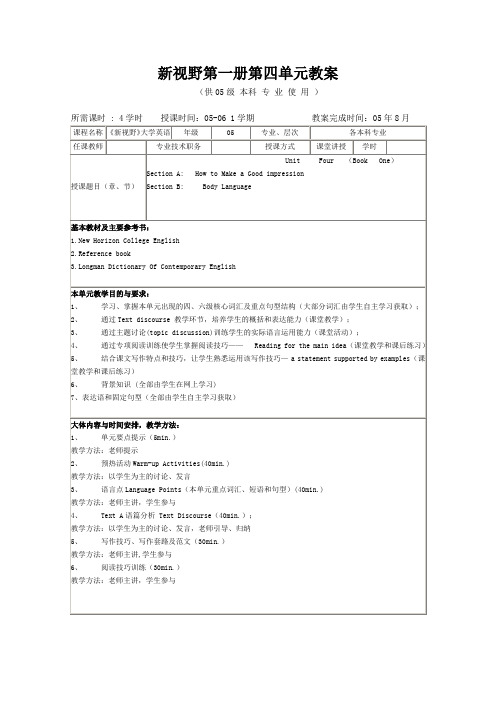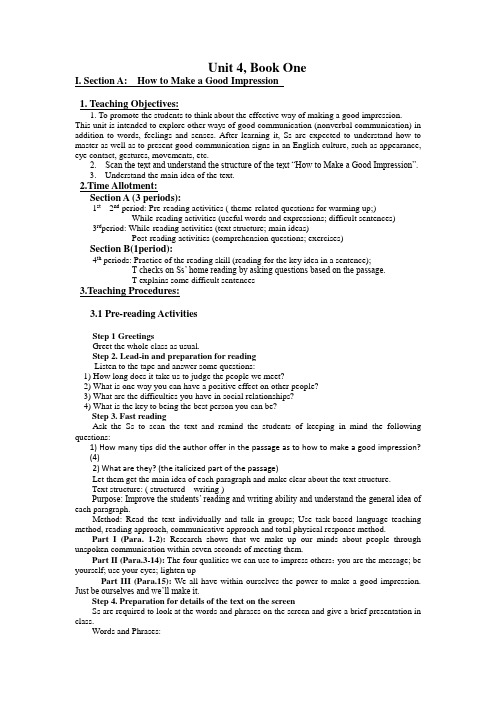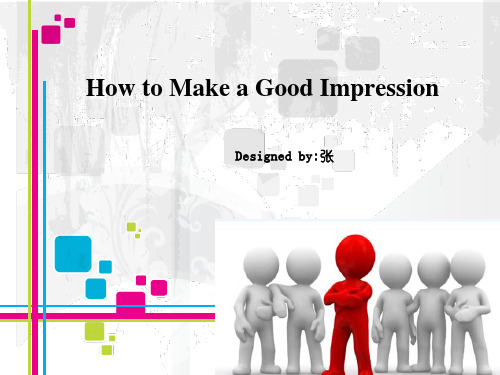新视野英语教程第一册4单元
新视野第一册第四单元教案

多媒体讲解30min.
多媒体讲解30min.
Focus rigid function snap belief
Gesture social campaign impression
Statement conscious interrupt status
Contact interview tone conviction
Judgment willingness depress obvious
Part I (Para.1-2)
Research shows that we make up our minds about people through unspoken communication within seven seconds of meeting them.
Devices for developing it ?
分配
I Key Points for this unit(15min.)
四级核心词汇
六级核心词汇
Absorb economic passive account
Encounter patience acquaint estimate
Pretend aggressive extend promote
Assume false range attitude audience
Aspiration
Intent
suspicious
短语
account for at one’s best
focus on make contact with
pick up
II Warm-up activity(introductory questions)
新视野大学英语第一册Unit4教案

Unit 4, Book OneI. Section A: How to Make a Good Impression1. Teaching Objectives:1. To promote the students to think about the effective way of making a good impression. This unit is intended to explore other ways of good communication (nonverbal communication) in addition to words, feelings and senses. After learning it, Ss are expected to understand how to master as well as to present good communication signs in an English culture, such as appearance, eye contact, gestures, movements, etc.2. Scan the text and understand the structure of the text “How to Make a Good Impression”.3. Understand the main idea of the text.2.Time Allotment:Section A (3 periods):1st---2nd period: Pre-reading activities ( theme-related questions for warming up;)While-reading activities (useful words and expressions; difficult sentences) 3rd period: While-reading activities (text structure; main ideas)Post-reading activities (comprehension questions; exercises)Section B(1period):4th periods: Practice of the reading skill (reading for the key idea in a sentence);T checks on Ss’ home reading by asking questions based on the passage.T explains some difficult sentences3.Teaching Procedures:3.1 Pre-reading ActivitiesStep 1 GreetingsGreet the whole class as usual.Step 2. Lead-in and preparation for readingListen to the tape and answer some questions:1) How long does it take us to judge the people we meet?2) What is one way you can have a positive effect on other people?3) What are the difficulties you have in social relationships?4) What is the key to being the best person you can be?Step 3. Fast readingAsk the Ss to scan the text and remind the students of keeping in mind the following questions:1) How many tips did the author offer in the passage as to how to make a good impression?(4)2) What are they? (the italicized part of the passage)Let them get the main idea of each paragraph and make clear about the text structure.Text structure: ( structured writing )Purpose: Improve the students’ reading and writing ability and understand the general idea of each paragraph.Method: Read the text individually and talk in groups; Use task-based language teaching method, reading approach, communicative approach and total physical response method.Part I (Para. 1-2):Research shows that we make up our minds about people through unspoken communication within seven seconds of meeting them.Part II (Para.3-14): The four qualities we can use to impress others:you are the message; be yourself; use your eyes; lighten upPart III (Para.15): We all have within ourselves the power to make a good impression. Just be ourselves and we’ll make it.Step 4. Preparation for details of the text on the screenSs are required to look at the words and phrases on the screen and give a brief presentation in class.Words and Phrases:Purpose:Train the Ss’ ability of understandi ng and using foreign language.Method: Talk in groups, Use task-based language teaching method, communicative approach and total physical response method.1) conscious: adj.realizing something 感觉到,意识到The children were conscious of their mother's unhappiness. 孩子们意识到母亲的不快。
新视野大学英语第一册第四单元课件 How to Make a Good Impression

paragraph analysis: Para. 6-9 (Be yourself)
Para. 6-7
Device 3: counter-example
Many how-to books advise you to stride into a room and impress
others with your qualities. They instruct you to greet them with "power handshakes" and tell you to fix your eyes on the other person. If you follow all this advice, you'll drive everyone crazy—including yourself.
Behavior
Appearance
Shake hands
Angry Tidy
Speech rate Tone of voice Speak in a clear voice Eye contact
Ⅱ. While-reading:
a. Skimming: Text Structure Analysis
paragraph analysis: Para. 3-5 (You are the massage)
Para.4:
Device 2: List Others will want to be with you and help you if you use your good qualities. They include: physical appearance, energy, rate of speech, pitch and tone of voice, gestures, expression through the eyes, and the ability to hold the interest of others.
新版新视野大学英语第一册Unit4 SectionB单词和例句

新视野大学英语读写教程(第二版)第一册单词表Unit 4 Section B Body LanguageNew Words<1>statement n. [C] sth. one says or writes 说法,叙述;声明The minister will make a statement tomorrow on the new educational plans. 部长明天将就新的教育计划发表一项声明。
In a statement, the paper admitted that it had given incorrect information. 在一份声明中,这家报纸承认他们提供了不正确的信息。
<2>snap a. done quickly and suddenly 匆忙的,仓促的A snap judgment will not do in that case. 在那种情况下,仓促下判断是不行的。
He always makes snap decisions and never thinks about their consequences. 他总是仓促作出决定,从来不考虑后果。
<3>judgment n. (BrE judgement)1. [C, U] an opinion 看法,意见;判断In his judgment, the red trousers can't match the green shirt. 在他看来,那条红裤子与那件绿衬衣不相配。
It's too soon to make a judgment about what the result will be. 现在就结果做出判断还为时过早。
2. [U] the ability to make wise decisions about what to do and when to do it 判断力;识别力He always shows excellent judgment in his choice of staff. 他在选择员工方面总显示出非凡的判断力。
新视野英语book1unit4.ppt

Don’ts
Don't wear heavy make-up and strong perfume. Don't be late. Don't eat, drink, chew gums or smoke. Don't cross your arms over your chest. Don't use cell phone in the interview. ...
Development (Paras.3~14)
Text Structure
The secrets to make a good impression: 1) You are the message. 2) Be yourself. 3) Use your eyes.
4) Lighten up.
Conclusion (Para.15)
Lead-in Video Clip Questions Answering Tips on communication
Question 1: What is your first impression on the woman in the movie?
Tips
Question 2: How did you get your judgments on the woman?
When introducing yourself
Smile truly. Offer a firm handshake. Greet politely.
Good posture?
Stand straight. Walk straight and sit straight. Sit at the front edge of the chair, leaning slightly forward.
li unit 4新视野第一册第四单元A

The author employs listing, [Paras. 3-15] This part answers the question of how and to make a good exemplification deduction to give a impression on others: You are the detailed explanation for the four secrets. message; be yourself; use your eyes; and For more details lighten up.
range vi.(在某范围内)变动,变化; vary ; 距离;
Consciously or unconsciously, we show our true feelings with our eyes, faces, bodies and attitudes, causing a chain of reactions, ranging from comfort to fear.
考点
1. Your university has made a favorable
on us. impression ___ 2. We have a deep impression ___ of Xiamen University. 3.We’re_____ under the impression that your university will have a promising future.
How to Make a Good Impression
随 笔 词汇学习 课文阅读
impression n .effect produced on the mind / feelings
新视野英语一unit4

You are the message. For 25 years I've worked with thousands who want to be successful. I've helped them make persuasive presentations, answer unfriendly questions, communicate more effectively. The secret has always been you are the message.
Think about some of your most unforgettable meetings: an introduction to your future spouse, a job interview, an encounter with a stranger. Focus on the first seven seconds. What did you feel and think? How did you "read" the other person? How do you think he read you?
humor (英 humour) n. 幽默,诙谐
▲brood v. (不快或怨忿地)想;忧伤;考虑
Phrases and Expressions
make up one's mind 下定决心,打定主意
range from... to... 从... 到... (范围或幅度内)变化
statement n. 说话,叙述,声明
snap a. 迅速的,突然的
judgment n. 1.看法,意见 2.判断力,识别力
新视野第一册4单元

PreviewWords, feelings and senses are only three of the ways we communicate with each other. In this unit, we explore how, whether we want them to or not, our gestures and our movements 'talk' to others. The three readings in this unit offer many suggestions about how to master good communication signs in an English culture. However, we must remember, it is the desire of the heart that matters most in effective communication, not the separate signs. We can master all the movements of communication and still not be effective. The caring Marine and the crippled father we met in Unit 3 are excellent examples of how all these suggested movements and gestures must work together to be effective. In effective communication, all aspects unite as one whole unit in order to win trust and respect from others.(How to Make a Good Impression)Research shows we makeupourminds about people through unspoken communication within seven seconds of meeting them. Consciously or unconsciously, we show our true feelings with our eyes, faces, bodies and attitudes, causing a chain of reactions,rangingfrom comfort to fear.Think about some of your most unforgettable meetings: an introduction to your future spouse, a job interview, an encounter with a stranger. Focuson the first seven seconds. What did you feel and think? How did you "read" the other person? How do you think he read you?You are the message. For 25 years I've worked with thousands who want to be successful. I've helped them make persuasivepresentations,answer unfriendly questions, communicate more effectively. The secret has always been you are the message.Others will want to be with you and help you if you use your good qualities. They include: physicalappearance, energy, rate of speech, pitch and tone of voice, gestures, expression through the eyes, and the ability to hold the interest of others. Othersform an impression about you based on these.Think of times when you know you made a good impression. What made you successful? You were committed to what you were talking about and so absorbed in the moment, you lost all self - consciousness.Be yourself. Many how-to books advise you to stride into a room and impress others with your qualities. They instruct you to greet them with "power handshakes" and tell you to fix your eyes on the other person. If you follow all this advice, you’ll driveeveryonecrazy - including yourself.The trick is to be consistently you, atyourbest.The most effective people never change from one situation to another. They’re the same whether they're having a conversation, addressing their garden club or being interviewed for a job. They communicatewith their whole being; the tones of their voices and their gestures match their words.Public speakers, however, often send mixed messages. My favorite is the kind who say, "Ladies and gentlemen. I'm very happy to be here" - while looking at their shoes. They don't look happy. They look angry, frightened or depressed.The audience always believe what they see over what they hear. They think, "He's telling me he's happy, but he's not. He's not being honest."Use your eyes. Whether you’re talking to one person or one hundred, always remember to look at them. Some people start to say something while looking right at you, but three words into the sentence, they break eye contact and look out the window.As you enter a room, move your eyes comfortably; then look straight at those in the room and smile. Smiling is important. It shows you are relaxed. Some think entering a room full of people is like going into a lion's cage. I disagree. If I did agree, I certainly wouldn't look at my feet or at the ceiling. I'd keep my eyes on the lion! Lightenup.Once in a staff meeting, one of the most powerful chairmen in the entertainment industry became very angry over tiny problems, scolded each worker and enjoyed making them fear him. When he got to me, he shouted, "And you, Ailes, what are you doing?"I said, "Do you mean now, this evening or for the rest of my life?" There was a moment of silence. Then the chairman threw back his head and roared with laughter. Others laughed too. Humor broke the stress of a very uncomfortable scene.If I had to give advice in two words, it would be "lighten up"! You can always see people who take themselves too seriously. Usually they are either brooding or talking a great deal about themselves.Take a good hard look at your self. Do you say "I" too often? Are you usually focused on your own problems? Do you complain frequently? If you answered yes to even one of these questions, you need to lighten up. To make others comfortable, you have to appear comfortable yourself. Don't make any huge changes; just be yourself. You already have within you the power to make a good impression, because nobody can be you as well as you can.(707words)"I liked him the minute I saw him!" "Before she even said a word, I knew there was something funny about her." Such statements are examples of "snapjudgments", opinions which are formed suddenly, seemingly on no sound reason at all. Most people say snap judgments are unsound or even dangerous. They also admit they often make snap judgments and find them to be fairly sound.Snap judgments like "love at first sight" or "instant hate", if taken seriously, have usually been considered signs of immaturity or lackof common sense. When someone "has a feeling" about someone else, people more often laugh than pay attention. Most people think you findout about a person by listening to what he says over a period of time. Others say "actionsspeaklouderthanwords," usually inrelationto keeping promises, paying bills or sending money home.Because people assume "you are what you say you are", they talk a lot to becomeacquaintedwith each other. Once two people have become acquainted, they think it was their conversation that gave them their information about each other.As behavioral sciences develop, however, researchers find the importance of speech has been overestimated. Although speech is the most obvious form of communication, we do use other forms of which we may be only partially aware or, in some cases, completely unaware. It is possible we are unconsciously sending messages with every action, messages which are unconsciously pickedup by others and used in forming opinions. These unconscious actions and reactions to them may inpartaccountfor our "feelings" and "snap judgments".We communicate a great deal, researchers have found, with our bodies - by the way we move, sit, stand and what we do with our hands and heads. Imagine a few people sitting in a waiting room: one is tapping his fingers on his briefcase, another keeps rubbing his hands together, another is biting his fingernails, still another grabs the arms of his chair tightly and one keeps running his fingers through his hair. These people aren't talking but they're "saying" a lot if you know the "body language" they're using.Two of the most "telling" forms of behavior are driving a car and playing games. Notice a person's reaction to stress in these situations and to aggressive behavior in others. Those who easily become angry, excited, passive or resentful when driving or playing may be giving insights into the inside self.While clothing serves a purely practical function, how you dress also communicates many things about your socialstatus, state of mind and even your aspirations and dreams. The eleven-year-old girl who dresses like a college student and the forty-year-old woman who dresses like a teenager are saying something through what they wear.What you communicate through your kind of dress definitely influences others to accept the picture of yourself you are projecting: in the business world, the person who dresses like a successful manager is most likely to be promoted into a managing position. Also important are the ornaments a person wears: buttons, medals,jewels, etc. Such ornaments are often the means by which a person announces a variety of things about himself: his convictions (campaign buttons), his beliefs( religioustokens ), his membership in certain groups ( club pins or badges ), his past achievements (college ring or PhiBetaKappa key) and his economic status (diamonds). Another sign of a person’s nature is said to be found in his choices in architecture and furniture. A person who would really like to live in a castle would probably be more athome in the Middle Ages. Those who like Victorian family houses and furniture might secretly welcome a return to more rigid social norms. People who arecontentwith modern design are probably comfortable with modern life-]styles.When you see a person for the first time, even though he doesn't speak to you, you begin watching him - his actions, his attitude, his clothing and many other things. There's awealthof information there if you know how to "read" it. Perhaps snap judgments aren't so unsound after all.(688 words)。
- 1、下载文档前请自行甄别文档内容的完整性,平台不提供额外的编辑、内容补充、找答案等附加服务。
- 2、"仅部分预览"的文档,不可在线预览部分如存在完整性等问题,可反馈申请退款(可完整预览的文档不适用该条件!)。
- 3、如文档侵犯您的权益,请联系客服反馈,我们会尽快为您处理(人工客服工作时间:9:00-18:30)。
Ⅰ.New words:1.airport n.航空港;飞机场[例] I live near the airport. 我住在飞机场附近。
[例] airport security 机场安全保卫2.allow vt. let (someone) do something;let (something) be done; permit 允许;准许[例] We allow smoking only in this area.我们只允许在这个区吸烟。
[例] Walking on the grass is not allowed. 不准践踏草地。
3.issue vt. produce (especiallysomething printed and/or official) 发行;发布[例] This stamp was issued 10 years ago.这张邮票是10年前发行的。
[例] issue a statement 发布一项声明n. 1). [C] a subject to be talked about, argued about, or decided upon 问题;议题[例] a key issue in the election 选举中的主要争论问题[例] I didn't want to make an issue of it.我不想去争论这件事。
2. [C] something that is produced so as to be publicly sold or given out 发行物[例] This is the latest issue of Time. 这是最新一期《时代》杂志。
[例] the Christmas issue圣诞特刊4.counter n. 1). [C] 柜台[例] This counter is closed now. 这个柜台现在已停止营业。
[例] under the counter秘密地;暗地里2). [C] a person or especially an electrical apparatus that counts 计算者;计算器[例] Set the counter to zero. 把计数器拨到零。
[例] a geiger counter盖氏计量器v. move or act in order to oppose or defend oneself against (something) 反对;对抗[例] She countered that she was too busy to complete the job. 她反驳说她太忙了所以做不完这工作。
[例] He countered my plan with one of his own.他以自己的一个计划来反对我的计划。
adv. opposed or opposite 相反地[例] run counter to one's will 与某人的意愿背道而驰[例] He acted counter to his promise. 他言行不一。
5.stare vi. look steadily for a longtime 凝视;瞪眼睛[例] He stared at the word, trying to remember what it meant. 他盯着这个单词,努力想记起它的意思。
[例] stare into the distance 凝视远方6.screen n. 1). [C] the front glasssurface of an electrical instrument 屏幕;荧光屏[例] Using a computer, one can change the text on the screen. 使用计算机,就可以在屏幕上作文字改动。
[例] This show will be back on your screens again next year. 这个节目明年将在电视上再次和大家见面。
2). [C] a surface on which a cinema film is shown (电影)银屏;银幕[例] a screen actor 电影演员[例] She first appeared on the screen ten years ago.10年前她在银幕上首次露面。
Vt. shelter or protect 遮蔽;掩护[例] She screened her eyes with her hands.她用手遮住双眼。
[例] screen somebody's faults 掩盖某人的过失7.backup n. C; U] a thing or personready to be used in place of, or to help, another 替代物;助手;支援人员[例] This is a backup computer. 这是一台备用的电脑。
[例] technical backup技术后备力量8.main adj. of greater size,importance, or influence than all others;chief 主要的;最重要的[例] the main road into town 进城的主要道路[例] I'd like to introduce the main point of my argument.我想介绍一下我辩论的要点。
9.pilot n. [C] a person who controlsan aircraft or spacecraft, especially one who has been specially trained 飞行员;宇航员[例] an airline pilot航空公司的飞行员[例] It is very hard to geta pilot's license.飞行员执照是很难考取的。
10.suggest vt. 1). state as anidea for consideration; propose 建议;提出[例] She suggested that we take a walk.她提议去散步。
[例] He suggested going out for a walk.他建议出去走走。
2). give signs (of); make clear, 显出;暗示[例] a silence that suggests disagreement 暗示着不同意的沉默[例] That girl's red face suggests excellent health.那个姑娘脸很红润,这表明她身体非常健康。
11.receipt n. 1). [C] a writtenstatement that one has received money (or sometimes goods) 收据;收条[例] When you have paid for something,a receipt is given to you. 你买东西付了钱,就会拿到收据。
[例] make out a receipt开收据2). [U] the fact of receiving 收到[例] We are in receipt of your letter. 我们已收到来函。
[例] pay the money on (the) receipt of goods收到货物即付款12.proof n. [C; U] (a) way of showingthat something is true; facts, information, documents, etc., that prove something 论证;证据[例] give proof of 证明,提供……的证据[例] There is no proof that he was on the crime spot.没有证据证明他当时在犯罪现场。
[例] scientific proof科学的证据13.charge v. 1). ask in payment 要价;索取;收费[例] charge ten dollars for a haircut 理一次发要价10美元[例] The cafédid not charge for the second cup of coffee. 这个咖啡馆第二杯咖啡不需付钱。
2). 控告;指控[例] The police charged him with car theft.警方以偷车罪指控他。
[例] He was charged with stealing a wallet.他被指控偷了一个钱包。
n. 1). [C; U] the price asked or paid for goods or a service 价钱;费用[例] a charge for the use of the telephone 使用电话的费用[例] The charge for a ticket is $3. 票价是每张3美元。
2. [U] 主管;责任[例] take charge of a department 负责一个部门[例] The mayor put him in charge of the school.市长任命他为校长。
14.fare n. [C] the price charged tocarry a person by bus, train, taxi, plane, etc. 车费;票价[例] a bus fare公共汽车费[例] How much is the single fare? 单程票多少钱?15.moment n. 1). [C] a particulartime 某一时刻[例] I am busy at the moment. 我此刻很忙。
[例] He was not here at that moment.他当时不在这儿。
2). [C] a very short period of time 片刻;一会儿[例] I'll be with you in a moment. 我过会儿就和你在一起。
[例] Just a moment. 请稍等片刻。
16.spread v. 1). make widelyknown 传播;流传[例] spread the news 传播消息[例] The word spread fast. 消息传播得很快。
